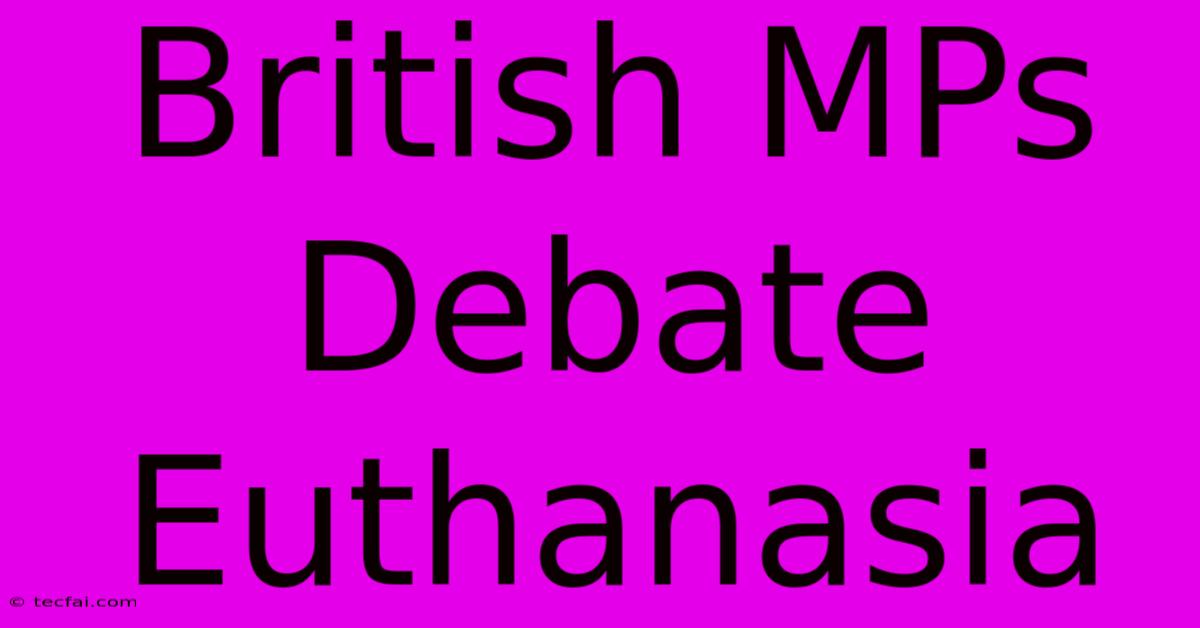British MPs Debate Euthanasia

Discover more detailed and exciting information on our website. Click the link below to start your adventure: Visit Best Website tecfai.com. Don't miss out!
Table of Contents
<h1>British MPs Debate Euthanasia: A Complex Moral and Ethical Tightrope</h1>
The debate surrounding euthanasia and assisted dying in the United Kingdom is a long-standing and deeply complex one, fraught with ethical, moral, and practical considerations. Recently, British MPs have once again engaged in fervent discussions, highlighting the ongoing tension between individual autonomy and the sanctity of life. This article delves into the key arguments presented, the challenges involved, and the potential implications of legalizing assisted dying in the UK.
<h2>The Core Arguments For and Against Legalization</h2>
The debate on euthanasia in the UK is not a simple “yes” or “no” proposition. Proponents and opponents cite compelling arguments rooted in different ethical frameworks and societal values.
<h3>Arguments in Favor of Legalization:</h3>
- Individual Autonomy: A central argument is the right of individuals to make choices about their own lives, especially when facing unbearable suffering. Supporters argue that competent adults should have the agency to choose a peaceful death if their quality of life has deteriorated beyond repair. This aligns with broader discussions around patient rights and bodily autonomy.
- Compassion and Relief of Suffering: Advocates highlight the profound suffering endured by individuals with terminal illnesses. They believe that providing a legal and medically supervised pathway to death offers a compassionate alternative to prolonged and agonizing pain. This focus on alleviating suffering is a key element of the ethical arguments.
- Preventing Unnecessary Suffering for Families: The emotional toll on families witnessing a loved one's prolonged suffering is immense. Legalized assisted dying could offer a less emotionally devastating end-of-life experience for both the patient and their loved ones.
- Safeguards and Regulation: Proposals for assisted dying legislation often include stringent safeguards, such as multiple medical assessments, psychological evaluations, and waiting periods, to minimize the risk of abuse or coercion.
<h3>Arguments Against Legalization:</h3>
- Sanctity of Life: Opponents strongly emphasize the inherent value of human life, regardless of its quality. They believe that ending a life, even at the request of the individual, is morally wrong and violates fundamental ethical principles.
- Slippery Slope Concerns: A significant concern centers on the potential for a “slippery slope,” where the legalization of assisted dying for terminally ill patients could lead to its expansion to encompass other vulnerable populations, potentially leading to abuse.
- Vulnerability of the Elderly and Disabled: Critics fear that the legalization of assisted dying could disproportionately affect vulnerable individuals who might feel pressured to end their lives due to societal biases or lack of adequate care.
- Imperfect Medical Predictions: The accuracy of predicting the time of death is not always perfect. There is a risk that individuals who choose assisted dying might recover later.
<h2>The Current Legal Landscape and Recent Debates</h2>
Currently, assisted dying remains illegal in the UK. However, the debate continues to evolve, fueled by numerous cases that highlight the complex ethical dilemmas faced by individuals and their families. Recent parliamentary discussions have focused on refining the legal framework and exploring potential compromises. These discussions often revolve around tightening existing regulations, creating tighter frameworks for supervision, and addressing specific concerns raised by opponents.
<h2>The Way Forward: Finding a Balance</h2>
The debate surrounding euthanasia in the UK is a multifaceted challenge requiring careful consideration of individual rights, ethical principles, and practical safeguards. Finding a balance between respecting individual autonomy and protecting vulnerable populations is paramount. Future discussions must focus on:
- Robust safeguards and regulations: Ensuring a system that minimizes the risk of abuse and coercion is crucial to gaining public trust.
- Improved palliative care: Expanding access to high-quality palliative care could reduce the need for assisted dying by providing effective pain management and support for patients and families.
- Open and honest public discourse: Continued, respectful dialogue is vital to understanding different perspectives and reaching a consensus on this sensitive issue.
The ongoing debate in the UK parliament reflects a societal struggle to navigate a complex ethical landscape. While there is no easy answer, open dialogue and careful consideration of all arguments are crucial in shaping future legislation.

Thank you for visiting our website wich cover about British MPs Debate Euthanasia. We hope the information provided has been useful to you. Feel free to contact us if you have any questions or need further assistance. See you next time and dont miss to bookmark.
Featured Posts
-
Gately Partner Ordered To Leave Dublin Home
Nov 30, 2024
-
Bawi Ni Pas Sa Yaman Ni Anwar
Nov 30, 2024
-
Notre Dame Post Restoration Images
Nov 30, 2024
-
Patagonia Gold Q3 2024 Results
Nov 30, 2024
-
Gatland Witnesses Lions Demise
Nov 30, 2024
